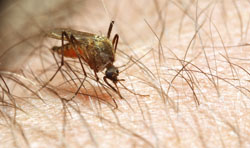Africa and Europe join forces against malaria
Malaria is the world's most important tropical parasitic disease with 300–500 million people becoming ill from it every year. Mortality rates among patients are high with an estimated one to two million annual deaths, mainly among young children. Combined with the growing resistance of parasites to existing anti-malaria drugs, novel measures against this deadly infectious disease are required. Combination therapies with artemisinin-based drugs are the way forward for malaria treatment, but they also run the risk of losing their effectiveness. To prevent that from happening, the EU-funded MALACTRES project investigated the existence of specific resistance genes associated with increased parasite transmission after treatment. In this context, partners conducted artemisinin-based combination therapy (ACT) trials and assessed the impact of various genes on parasite prevalence, longevity and transmission. Further genetic analysis of parasites that are less responsive to the therapeutic efficacy of ACTs has the potential to identify candidate resistance markers. Considerable effort was also placed on the development of molecular diagnostic assays based on the polymerase chain reaction (PCR) principle that could be used to detect all known parasite species directly from the blood of an individual. Partners are confident that these tests can be used in the field for robust and rapid screening of candidate infections. The MALACTRES study has significantly contributed to the long-term fight against drug resistance by providing invaluable insight into candidate genetic markers implicated in the process. Coupled with prompt diagnosis, this knowledge will lay the ground for the implementation of combination therapies to achieve malaria eradication.





